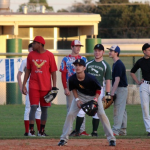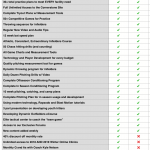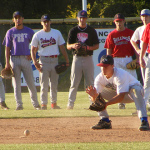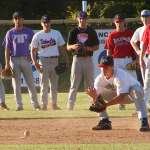When Times Get Tough
Anyone who plays or coaches baseball in the Midwest right now is probably more frustrated by the weather than anything else. It seems like just as we get a slight break, the gets worse than it was before. First we had snow and a late cold, then rain followed by even more rain. There has been no time to get any kind of rhythm or flow with a series of outdoor practices and games. We have now reached the point of the year where we will be lucky to get one outdoor practice per week since any nice day will be taken up by make-up games. Pitching staffs will be stretched thin and players will begin to get weary from getting home late night after night while still trying to juggle school work, family and social life, and trying to find enough down time to remain sane.
Coaching is easy when everything is going smoothly and everyone is happy. It is much tougher when times are rough, patience is running thin, and players, coaches, and parents are frustrated by events that are out of their control. Quality coaches will be able to hold a team together and salvage the season while still influencing their athletes in a positive manner and developing them as players and people. If a coach is not careful in these situations, they can easily lose their team and will not get the most out of them.
It is ok to tell athletes you are frustrated, but don’t show it openly.
If you acted as if everything were normal, you players will see right through it. They know you are frustrated by the weather so saying otherwise will not benefit anyone. Remember, players will follow the coach’s lead. If the coach is negative and complains openly about the weather and lets it affect the way they go about their business, the players will respond in kind. Practices will become less productive and athletes will become disinterested.
Manage and schedule your practice time wisely.
We all know that baseball a gym (or even a field house) is not real baseball. Indoor practice can be used to develop skills and technique, but there comes a point where indoor practices give diminishing returns. Coaches should be able to read their teams to determine when indoor practices will begin to deteriorate and no longer be beneficial. At this point, don’t be afraid to give a day or two off and try something different like a movie or team dinner to keep morale up.
Maximize your team’s outdoor practice time.
When a rare outdoor practice does occur, don’t spend time working on the techniques and skills you were able to develop indoors. Spend that precious time working on the tactics of the game. Run a controlled scrimmage where either coaches pitch to live hitters or a coach hits fungo with live runners on base. Be prepared with the situations you need to cover and be prepared to stop to cover a number of topics that come up during the scrimmage. Playing the game is the best way for your athletes to learn the game, there is no indoor substitute for this.
Control what you can control
Give your athletes the “control what you can control” speech and set a good example of what it looks like. The weather, like many things that happen in the game of baseball, are out of your control. Don’t stress over those things, and don’t let your athletes become consumed by them. Carry this philosophy over to the playing field in your interactions with umpires, your reactions to bad hops, great plays by opponents, and “unlucky” breaks. This will help players focus on what they can control, and will allow them to reach their maximum performance level.
The above is just a small sample of what can be found in Cornerstone’s Silver Certification course at www.cornerstonecoachingacademy.com/silver-certification.
 Posted by Kyle Nelson
Posted by Kyle Nelson- Posted in Uncategorized
 Apr, 18, 2013
Apr, 18, 2013 No Comments.
No Comments.
Elite members login here
Check out what’s New/Hot!
Recognizing, Diagnosing, and Fixing Common Hitting Flaws eCourse The 3 metrics we tested on Blast motion sensors this year Sneak Peek Inside an Elite Q and A The batting practice continuum Elite Member’s area table of contents 50+ “Chaos” hitting drills
5 sample Chaos hitting drills FREE
Mental Skills and Culture Building The hitting pyramid Welcome Elite Member, Trey! Ideas for a pitcher first practice 12 week bat speed improvement plan Make plans this offseason to have your team playing their best baseball at the end of the year” Top 5 hitting drills to translate practice skill to game performanceHow we used Blast Motion sensors with a team in 2019
What to do if your hitters are overmatched Welcome Elite Member, Tommy! Setting your baserunners up for success Welcome Elite Member, Mike! A consulting call with Elite Member Matt FREE Web Clinic: Developing Athletic, Consistent, Extraordinary Infielders
 Coach Kyle Nelson
Coach Kyle Nelson




